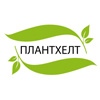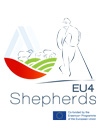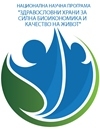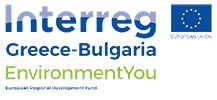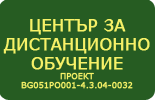European funds and projects
|
Course title: |
European funds and projects |
|
|
Course code: |
IFEEP |
|
|
ECTS: |
3 |
|
|
In-class hours |
Lectures: |
30 |
|
Laboratory work/Tutorials: |
15 |
|
|
Self-preparation hours |
Practical training: |
20 |
|
Other: |
10 |
|
|
Total hours: |
75 |
|
|
Language: |
English |
|
|
Study cycle: |
BSc, Master |
|
|
Semester: |
Winter, summer |
|
|
Faculty: |
Faculty of Economics |
|
|
Name of the lecturer(s): |
Prof. Ivan Penov, PhD |
|
|
Mode of delivery: |
Face-to-face, distance learning |
|
|
Prerequisites: |
Public Economics or Microeconomic or Agricultural Economics |
|
|
Learning outcomes of the course unit: |
The course provides to the students knowledge about EU funds and how they work. The course has three main parts. The first part concentrates on the logic and principles of EU Funds. The history and motivation for the establishment of the main funds is reviewed. The second part concentrates on the principle and the frame of using the funds. The structure of operational programmes and the process of measures’ design is presented. The third part concentrates on the operational programs in Bulgaria. All programmes are presented and their structure analyzed. Special attention is also paid to the Rural development program and the Fishery program. At the end of the course, the students are expected to have a good understanding of the structure and the process of operational programs development. They will also have the skills to design measures and analyze their impact. This course links the public policy theory with the process of designing the policy instruments and procedures for their implementation. |
|
|
Course contents: |
LECTURES 1. INTRODUCTION Course outline. Knowledge and skills acquired during the course 2. EUROPEAN ECONOMIC INTEGRATION Europe after the second world war. Justification of economic integration. Theories supporting the common market. Theories against the common market. European Union 3. STATE INTERVENTION IN THE ECONOMY Market model. Market failures. State support. 4. ECONOMIC AND SOCIAL COHESION European market. Legislation regarding economic and social cohesion. The goal of the policy for economic and social cohesion. Regional policy 5. EUROPEAN FUNDS Principles. Concentration. Co-ordination. Programming. Partnership. Co-Financing. Additionality. EU funds: European Regional Development Fund ERDF, European Social Fund ESF, Cohesion Fund CF, European Agricultural Guarantee Fund (EAGF), European Agricultural Fund for Rural Development (EAFRD), European Fisheries Fund. European investment bank. 6. FRAME FOR USING EU FUNDS Community Strategic Guidelines - EU Level. National Strategic Reference Framework - National level. National Development Plan (NDP). Operational programs. Measures. 7. OPERATIONAL PROGRAM Analysis of the current condition. Defining the goals. Defining the priorities. Defining the measures. Management of operational programs. Financial framework. 8. DEVELOPMENT OF A MEASURE Importance of the measures. Structure of a measure. Measure development 9. EUROPEAN FUNDS AND BULGARIA National Development Plan 2007-2013. National Strategic Reference Framework (NSRF) 2007-2013 г. Operational programmes: Regional Development, Competitiveness, Human Resources Development, Administrative Capacity, Transport, Environment, Technical Assistance. Other programs. National strategic plan for rural development in Bulgaria. Rural development programme of Bulgaria 2007-2013. National strategic plan for the development of fishery and aquacultures. OP Fishery.
TUTORIALS 1. EUROPEAN FUNDS. Principles. EU funds 2. FRAME FOR USING EU FUNDS 3. OPERATIONAL PROGRAM 4. DEVELOPMENT OF A MEASURE. Structure of a measure. Development of a measure. 5. EUROPEAN FUNDS AND BULGARIA. National Development Plan 2007-2013. National Strategic Reference Framework (NSRF) 2007-2013 г. Operational programmes. Other programs |
|
|
Recommended or required reading: |
Информационен център на ЕС (2009). „Европейски структурни фондове в България 2007-2013”. http://www.eufunds.bg/ Информационен център на ЕС (2009). „Европейски програми 2007-2013-справочник”. http://www.eufunds.bg/ National Development Plan 2007-2013. http://www.eufunds.bg/ National Strategic Reference Framework (NSRF) 2007-2013 г. http://www.eufunds.bg/ National strategic plan for rural development in Bulgaria.http://www.eufunds.bg/ National strategic plan for development of fishery and aquacultureshttp://www.eufunds.bg/ OP Regional Development. http://www.eufunds.bg/ OP Competitiveness. http://www.eufunds.bg/ OP Human Resources Development. http://www.eufunds.bg/ OP Administrative Capacity. http://www.eufunds.bg/ OP Transport. http://www.eufunds.bg/ OP Environment. http://www.eufunds.bg/ OP Technical Assistance. http://www.eufunds.bg/ Rural development programme of Bulgaria 2007-2013. http://www.mzh.government.bg OP Fishery. http://www.mzh.government.bg REGULATION (EC) No 1080/2006 OF THE EUROPEAN PARLIAMENT AND OF THE COUNCIL of 5 July 2006 on the European Regional Development Fund and repealing Regulation (EC) No 1783/1999 REGULATION (EC) No 1081/2006 OF THE EUROPEAN PARLIAMENT AND OF THE COUNCIL of 5 July 2006 on the European Social Fund and repealing Regulation (EC) No 1784/1999 COUNCIL REGULATION (EC) No 1083/2006 of 11 July 2006 laying down general provisions on the European Regional Development Fund, the European Social Fund and the Cohesion Fund and repealing Regulation (EC) No 1260/1999 COUNCIL REGULATION (EC) No 1084/2006 of 11 July 2006 establishing a Cohesion Fund and repealing Regulation (EC) No 1164/94 COUNCIL REGULATION (EC) No 1290/2005 of 21 June 2005 on the financing of the common agricultural policy COUNCIL REGULATION (EC) No 1198/2006 of 27 July 2006 on the European Fisheries Fund |
|
|
Planned learning activities and teaching methods: |
The main part of the material in European Funds and Programs is taught through lectures. The tutorials are organized as discussions with the aim of the students to understand the structure and the logic of the funds and the operational programmes. Based on the analysis of the existing operational programs, the students are asked to design an “improved measure” for some of the programs. |
|
|
Assessment methods and criteria: |
Participation in class discussions-20% Interim exams- 30% Final written exam- 50% |
|
 - Събития по случай 80-я юбилей на АУ
- Събития по случай 80-я юбилей на АУ
